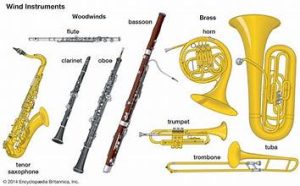Uncategorized
How Musical Instruments Enhance Emotional and Social Skills
How Musical Instruments Enhance Emotional and Social Skills
Learning and playing a musical instrument is not just about developing technical abilities; it has a profound impact on emotional well-being and social skills. Whether you’re strumming a guitar, playing the piano, or blowing into a flute, the process of making music can significantly enhance emotional intelligence, improve social connections, and foster a sense of belonging. At Onebestluxetexas, we believe in the transformative power of music and offer a variety of musical instruments to help you on your journey. In this article, we’ll explore how musical instruments can boost your emotional and social skills, providing both personal and collective benefits.
1. Emotional Expression and Regulation
One of the most significant emotional benefits of playing a musical instrument is the ability to express complex feelings. Music provides a safe space to channel emotions, whether it’s joy, sadness, anger, or hope. Learning an instrument helps develop emotional awareness, allowing individuals to better understand and express their feelings.

Emotional Expression:
- Music as a Mirror: Music often reflects our emotions, enabling musicians to express what words cannot. For instance, a pianist can convey sadness through a slow, minor key piece, or joy through an upbeat major melody.
- Cathartic Release: Playing an instrument offers an emotional release, allowing individuals to cope with stress, anxiety, or depression. Whether you’re letting out frustration on the drums or releasing tension through a soulful guitar solo, music becomes an outlet for pent-up emotions.
Emotional Regulation:
- Self-Control: Learning an instrument requires focus, patience, and discipline. Through practice and mastery, musicians develop the ability to regulate their impulses and emotions. For example, a beginner guitarist must learn to control their frustration during practice, which translates to greater emotional control in everyday situations.
- Mindfulness: The act of playing music requires concentration, which can help people stay grounded in the present moment. This mindfulness practice promotes emotional well-being by reducing stress and fostering relaxation.
2. Building Empathy and Understanding
Playing music helps individuals connect with others, often on an emotional level that goes beyond verbal communication. Through music, we can understand and empathize with others’ feelings, creating deeper connections.
Connecting Through Shared Experience:
- Group Performance: In a band, orchestra, or any musical group, musicians often have to work together in harmony, listening to each other and responding in real-time. This fosters empathy as each member becomes attuned to the emotions and needs of the others. A violinist in an orchestra, for example, must understand the timing and emotions of the other sections to create a cohesive piece.
- Collaborative Communication: Music is a form of nonverbal communication. It helps individuals learn how to interpret body language, eye contact, and subtle emotional cues from other musicians. This collaboration enhances empathy, as players must be receptive to one another’s intentions and feelings.
Understanding Diverse Perspectives:
- Cultural Expression: Musical instruments allow individuals to explore different cultures and emotions. For instance, learning traditional instruments like the sitar or djembe can foster a deeper understanding of the cultural contexts behind the music. This broadened perspective can increase empathy for different social or cultural groups.
- Emotional Awareness: Through the stories conveyed by music, musicians gain insight into the emotions of others. A blues guitarist, for example, can understand and express themes of struggle and resilience, fostering emotional empathy for those who have faced similar challenges.
3. Improved Social Skills and Teamwork
Playing an instrument, especially in a group setting, naturally fosters collaboration and enhances social skills. Musicians learn to communicate without words, working together to produce a unified performance. These skills extend beyond the band or orchestra setting and can improve everyday social interactions.
Collaboration and Teamwork:
- Creating Together: Musicians in a band, choir, or orchestra must rely on each other to create beautiful music. Whether you’re playing an instrument or singing, you need to coordinate with others to create harmony and balance. This teaches the importance of cooperation and respect for others’ contributions.
- Leadership and Accountability: In many musical settings, some individuals are called upon to lead the group, such as a bandleader or first chair in an orchestra. These roles foster leadership skills, teaching individuals how to motivate, guide, and hold themselves and others accountable.
Effective Communication:
- Nonverbal Communication: Music is an intuitive language. Through shared performances, musicians learn to listen actively, respond appropriately, and interpret emotions without speaking. This can translate to improved communication skills in social settings.
- Conflict Resolution: Working with a group of musicians often involves navigating differences in opinion or style. These challenges require compromise, negotiation, and open dialogue—skills that are valuable in any social interaction.
4. Boosting Self-Esteem and Confidence
As with any skill, mastery of an instrument leads to a sense of accomplishment and pride. This, in turn, boosts self-esteem and confidence. The process of learning, practicing, and performing music allows individuals to see their progress and celebrate small victories.

Building Confidence:
- Mastery: Over time, the more an individual practices and perfects their instrument, the more confident they become in their abilities. This sense of achievement is invaluable in enhancing self-esteem.
- Performing in Public: For many, the ultimate test of confidence is performing in front of an audience. Whether it’s at a school recital or a live concert, musicians often feel nervous before a performance, but successfully completing a piece builds immense confidence and self-assurance.
Overcoming Self-Doubt:
- Facing Challenges: The journey to becoming proficient at an instrument is filled with challenges—technical difficulties, mental blocks, and moments of frustration. However, overcoming these challenges teaches resilience and the belief that they can tackle any task that comes their way.
- Positive Reinforcement: The act of playing music can also provide immediate feedback, whether it’s the positive reaction of an audience or a personal feeling of satisfaction. This reinforcement encourages a positive self-image and a belief in one’s abilities.
5. Cognitive and Emotional Growth
Learning a musical instrument also has a profound impact on cognitive development, which directly influences emotional growth. Studies have shown that musical training enhances memory, focus, and problem-solving skills, which in turn can improve emotional regulation and self-awareness.
Cognitive Benefits:
- Memory and Focus: Playing an instrument requires memorizing pieces, focusing on timing, and processing multiple layers of information. These cognitive skills improve with practice and enhance mental clarity and emotional intelligence.
- Problem-Solving: When learning a new piece of music or overcoming a technical hurdle, musicians engage in problem-solving, which boosts their critical thinking and emotional resilience.
Emotional Intelligence:
- Self-Awareness: The reflective nature of playing an instrument allows individuals to become more aware of their emotions and how they respond to different situations. This awareness leads to better emotional control and more positive interactions with others.
- Emotional Resilience: Learning music teaches musicians to handle setbacks and imperfections. Instead of being discouraged by mistakes, musicians learn to adapt and grow, which builds emotional strength over time.
Conclusion
Musical instruments are more than just tools for creating sound; they are gateways to enhanced emotional and social skills. From building empathy and improving communication to boosting self-esteem and emotional regulation, playing an instrument offers far-reaching benefits. Whether you’re looking to express your feelings, connect with others, or develop a deeper understanding of yourself, music is a powerful means of growth. At Onebestluxetexas, we offer a wide selection of musical instruments that can help you enhance both your emotional and social skills, and take your musical journey to the next level. Start playing today, and discover the transformative power of music!

